 Candle & Crow (Ink & Sigil, #3) by Kevin Hearne
Candle & Crow (Ink & Sigil, #3) by Kevin Hearne Narrator: Luke Daniels
Format: audiobook, eARC
Source: purchased from Audible, supplied by publisher via Edelweiss
Formats available: hardcover, paperback, ebook, audiobook
Genres: paranormal, urban fantasy
Series: Ink & Sigil #3
Pages: 352
Length: 11 hours and 4 minutes
Published by Del Rey, Random House Audio on October 1, 2024
Purchasing Info: Author's Website, Publisher's Website, Amazon, Barnes & Noble, Kobo, Bookshop.org, Better World Books
Goodreads
From the New York Times bestselling author of The Iron Druid Chronicles comes the final book in the Ink & Sigil series, as an ink-slinging wizard pursues the answer to a very personal mystery: Who cast a pair of curses on his head?
Al MacBharrais has a most unusual job: He’s a practitioner of ink-and-sigil magic, tasked with keeping order among the gods and monsters that dwell hidden in the human world. But there’s one supernatural mystery he’s never been able to solve: Years ago, someone cast twin curses on him that killed off his apprentices and drove away loved ones who heard him speak, leaving him bereft and isolated.
But he’s not quite alone: As Al works to solve this mystery, his friends draw him into their own eccentric dramas. Buck Foi the hobgoblin has been pondering his own legacy—and has a plan for a daring shenanigan that will make him the most celebrated hobgoblin of all. Nadia, goth queen and battle seer, is creating her own cult around a god who loves whisky and cheese.
And the Morrigan, a former Irish death goddess, has decided she wants not only to live as an ordinary woman but also to face the most perilous challenge of the mortal world: online dating.
Meanwhile, Al crosses paths with old friends and new—including some beloved Druids and their very good dogs—in his globe-trotting quest to solve the mystery of his curses. But he’s pulled in so many different directions by his colleagues, a suspicious detective, and the whims of destructive gods that Al begins to wonder: Will he ever find time to write his own happy ending?
My Review:
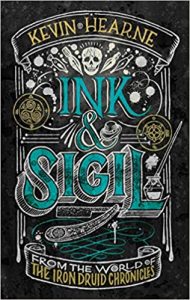 When we first met sigil agent Al MacBharrais back in Ink & Sigil, standing in the apartment of his seventh and latest apprentice – along with the corpse of said apprentice AND a caged HOBGOBLIN – we’re instantly aware of several things. Al’s world is just a bit bigger than the one we think we know, he has an absolutely fascinating line of work, and he’s in deep shit.
When we first met sigil agent Al MacBharrais back in Ink & Sigil, standing in the apartment of his seventh and latest apprentice – along with the corpse of said apprentice AND a caged HOBGOBLIN – we’re instantly aware of several things. Al’s world is just a bit bigger than the one we think we know, he has an absolutely fascinating line of work, and he’s in deep shit.
Or shite, as Al would say. It’s the same substance either way and no one wants to be standing in it as deeply as Al is already standing. And the story has barely begun!
It began in Ink & Sigil with Al hunting down the beings who were trafficking in beings from the fae planes – like the hobgoblin Buck Foi. It middled with an ‘adventure’ in Australia in Paper & Blood, and it ends here, back in Al’s native Glasgow in Candle & Crow, as Al’s mission to end the careers of as many traffickers as possible – no matter what species of sentient being they might be trafficking – ties itself up with Al’s personal quest to learn who cursed him AND why so that he can finally train up an apprentice to mastery and retire before the myriad dangers of his fascinating line of work catch up with him – fatally.
Candle & Crow perches right on that crossroads between “crying because it’s over” and “smiling because it happened.” I’m going to miss Al and his friends, but this was absolutely the right end for this series and I’m happy that I got to see it – and that Al’s office manager, Gladys Who Has Seen Some Shite finally got to see the awesome shite that she came to see.
Escape Rating A: First of all – and last of all – Candle & Crow is an ending. Not just to the Ink & Sigil series, but by extension to the whole, entire Iron Druid Chronicles from which it sprang. Consider this a ginormous hint not to start here. It’s not necessary to start all the way back with the first book in the Iron Druid Chronicles, Hounded, and it’s absolutely not essential to have finished that series – because I haven’t and I still loved Al and his crew.
But you do need to start Al’s story with Ink & Sigil. And if you like urban fantasy, it is absolutely worth reading the whole glorious adventure.
 I actually read this twice, or rather I read it once and had it read to me once. The first time I read it I was sitting in the train station in Al’s native Glasgow, waiting for the train back to London and eventually home after the close of the Glasgow WorldCon. It was the perfect place to read this story, with the one caveat that it made me regret not having taken the time to visit the Glasgow Necropolis, if only to see how close the book’s description of the tomb of Isabella Ure Elder is to the real thing. (Based on the photo at right, the answer is VERY – admittedly without the “dreich” weather experienced both in the story and, honestly, for much of our trip.).
I actually read this twice, or rather I read it once and had it read to me once. The first time I read it I was sitting in the train station in Al’s native Glasgow, waiting for the train back to London and eventually home after the close of the Glasgow WorldCon. It was the perfect place to read this story, with the one caveat that it made me regret not having taken the time to visit the Glasgow Necropolis, if only to see how close the book’s description of the tomb of Isabella Ure Elder is to the real thing. (Based on the photo at right, the answer is VERY – admittedly without the “dreich” weather experienced both in the story and, honestly, for much of our trip.).
In the series of mad dashes, long waits, and exhaustion at the end of a glorious trip, I didn’t have the opportunity to write this review before the details flew – or more likely slept – their way out of my head. But Al’s story has been marvelous every step of the way, so I picked up the audiobook and listened to it all again. And loved it again.
However, I have to say that, although the story is obviously the same, listening to Candle & Crow is a MUCH different experience than reading it. (I also wonder whether the author wrote this book, or perhaps the whole damn series, at least in part, just to mess with his audiobook narrator Luke Daniels.)
About that story…some stories start out as a whole, then the layers get peeled back until it’s much bigger on the inside than it looked like from the outside. Candle & Crow goes the other way.
Initially it reads as a loose pile of unrelated threads. There’s Al’s continuing investigation into the curses that have done their damndest to wreck his life. Then there’s the problem that hobgoblin Buck Foi is drinking to keep himself from thinking about. On top of that there’s Al’s attempts to help the police by providing them with evidence of human trafficking – only for the local police to decide that Al only has such information because he’s one of the traffickers and harass him repeatedly over that mistaken assumption.
(This is the point where I need to comment that, as much as I enjoyed most of the narration, the voice used for Detective Inspector Munro would have worked equally well for Dolores Umbridge of Harry Potter infamy. That character grates, the voice used for her grated to the point that chalk on a blackboard would have been an improvement – and possibly at a lower and more tolerable pitch as well. Getting down off my soapbox now. Hem-hem.)
 On top of the issues that directly involved Al, there’s also the Morrigan’s desire to step away from her identity as “chooser of the slain” so she can fall in love, Al’s accountant Nadia and her search for a demi-godly purpose that turns to the founding of a new and potentially dangerous religion, and the ever-present question of exactly what sort of deity or superbeing Gladys Who Has Seen Some Shite might be when she’s not being Al’s receptionist and just how dangerous the shite she has been waiting around in Glasgow to see might be for Al and his friends.
On top of the issues that directly involved Al, there’s also the Morrigan’s desire to step away from her identity as “chooser of the slain” so she can fall in love, Al’s accountant Nadia and her search for a demi-godly purpose that turns to the founding of a new and potentially dangerous religion, and the ever-present question of exactly what sort of deity or superbeing Gladys Who Has Seen Some Shite might be when she’s not being Al’s receptionist and just how dangerous the shite she has been waiting around in Glasgow to see might be for Al and his friends.
Al has a LOT on his mind at all times. That discovering the ‘nine ways to Nancy’ turns out to be the perfect metaphor for tying all of the many threads of Al’s story into a neat bow of a perfect ending for the series made for a fantastic conclusion to a marvelous series.

 A Dark and Drowning Tide by
A Dark and Drowning Tide by  Lady Macbeth by
Lady Macbeth by 
 (If you’re wondering – as I was – it reminds me of
(If you’re wondering – as I was – it reminds me of  To Gaze Upon Wicked Gods (Gods Beyond the Skies, #1) by
To Gaze Upon Wicked Gods (Gods Beyond the Skies, #1) by 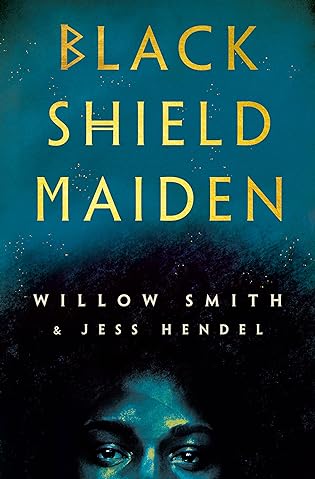 Black Shield Maiden by
Black Shield Maiden by  Escape Rating A-: I came to this book by an odd route. I watched a playthrough of
Escape Rating A-: I came to this book by an odd route. I watched a playthrough of 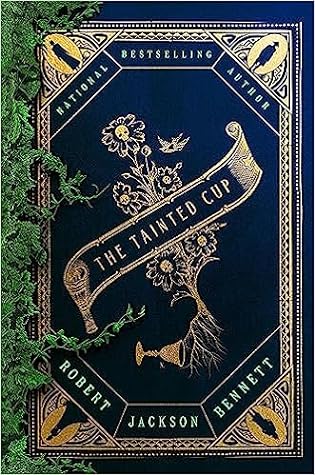 The Tainted Cup (Shadow of the Leviathan, #1) by
The Tainted Cup (Shadow of the Leviathan, #1) by 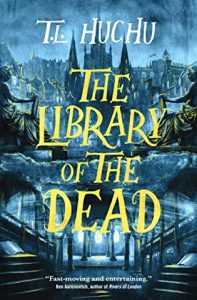 Escape Rating A+: There’s been a rise in science fiction mysteries in the last couple of years, with books like Mur Lafferty’s
Escape Rating A+: There’s been a rise in science fiction mysteries in the last couple of years, with books like Mur Lafferty’s 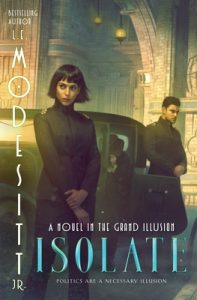 But the setting of The Tainted Cup, and the epically FUBAR political situation therein, is very much fantasy of both the grimdark and steampunk varieties. The world, with its mixture of science and magic and scientifically based magic is similar to the setting of L.E. Modesitt’s
But the setting of The Tainted Cup, and the epically FUBAR political situation therein, is very much fantasy of both the grimdark and steampunk varieties. The world, with its mixture of science and magic and scientifically based magic is similar to the setting of L.E. Modesitt’s 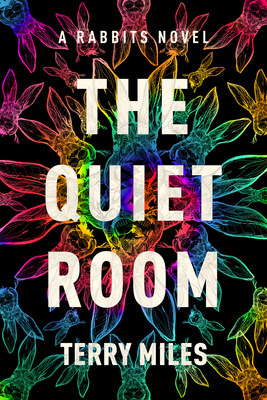 The Quiet Room (Rabbits, #2) by
The Quiet Room (Rabbits, #2) by 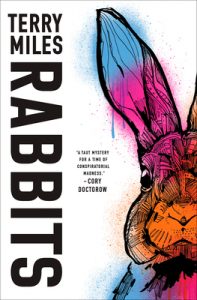 Escape Rating B: I honestly did not expect to like The Quiet Room. The first book in the series, titled
Escape Rating B: I honestly did not expect to like The Quiet Room. The first book in the series, titled 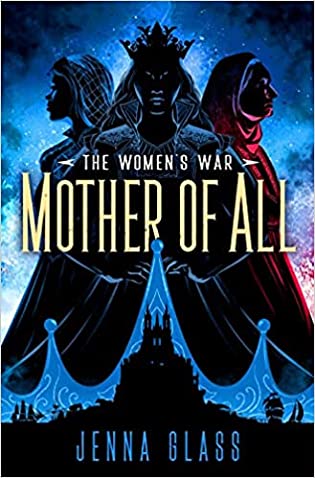 Mother of All (Women's War, #3) by
Mother of All (Women's War, #3) by 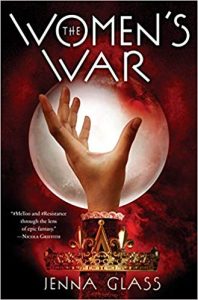 The story of Women’s War is a single story spread over three not insubstantial parts, meaning that it begins in the first book,
The story of Women’s War is a single story spread over three not insubstantial parts, meaning that it begins in the first book, 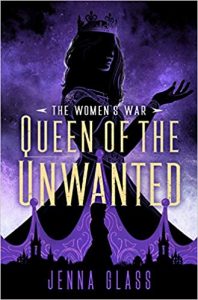 Escape Rating A: Short summary of the series – loved the first book, wasn’t all that thrilled with the second but it was necessary, loved the third book. This book. Mother of All brought this epic trilogy to an appropriately epic conclusion, and it made wading through all the setup and political positioning and maneuvering in the second book worth the wade. Also worth the wait of anticipating this conclusion.
Escape Rating A: Short summary of the series – loved the first book, wasn’t all that thrilled with the second but it was necessary, loved the third book. This book. Mother of All brought this epic trilogy to an appropriately epic conclusion, and it made wading through all the setup and political positioning and maneuvering in the second book worth the wade. Also worth the wait of anticipating this conclusion.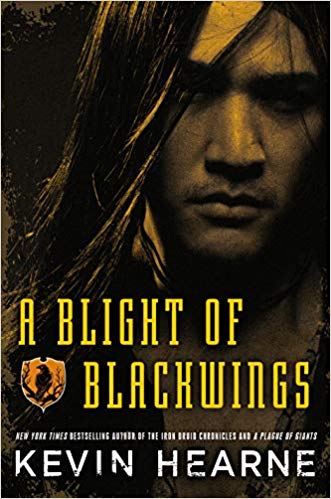 A Blight of Blackwings (Seven Kennings, #2) by
A Blight of Blackwings (Seven Kennings, #2) by 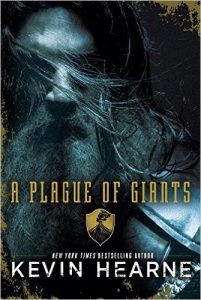 Just as in the first book in the series, the extremely awesome and utterly marvelous
Just as in the first book in the series, the extremely awesome and utterly marvelous 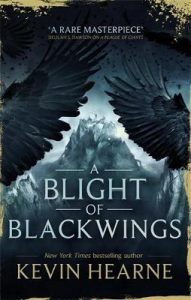
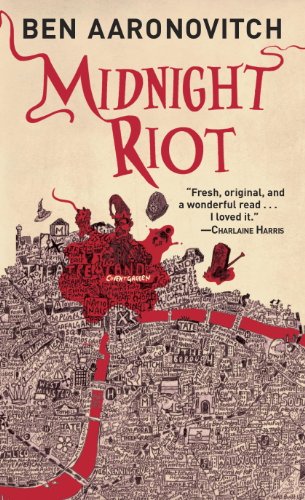 Midnight Riot (Peter Grant, #1) by
Midnight Riot (Peter Grant, #1) by